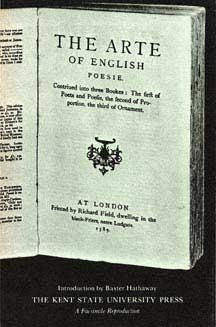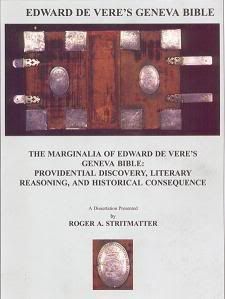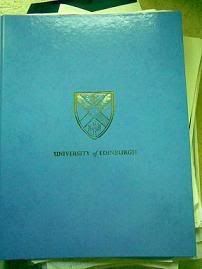So let this be an introduction into a series of posts where I bring to the public eye the contents of my bookshelf (and the floor next to my desk, where I keep my favourite ones). Because what could be more interesting than seeing tiny pictures of books in bad quality and reading about my take on them? Absolutely nothing, you guessed right.
But before I get down to business, I must bring to every reader's attention an interesting point that I found out about only recently.
The title for this post was derived from the poem My mind to me a kindgom is, published in 1588, traditionally attributed to Sir Edward Dyer (1543(?)-1607). I always try to come up with titles that have some pretentious, quasi-artistic literary allusions in them.
Dyer was a contemporary of Shakespeare's, a courtier poet whom inter alia George Puttenham praised in his Arte of English Poesie (1589), an account of notable English writers at the time. Which by the way I absolutely had to have on my laptop at home in its original spelling, so I can read it over and over so my heart with pleasure fills.

Wordsworth is quite alright you know. And I like linking every other word to a Wikipedia article. Wikipedia is a good source for trivia that you don't want to memorize, especially if it doesn't matter whether the information is in the end accurate or not.
Now here comes the funny part. More recently (in 1975 in The Review of English Studies Vol. 26, to be accurate), the poem has been attributed by Stephen W. May to the 17th Earl of Oxford, Edward de Vere (1550-1604).

(Young Edward de Vere)
Before that, Alden Brooks had proposed in his 1943 book Will Shakspere and the Dyer's hand that the above-mentioned sir Edward Dyer was the true William Shakespeare. In other words, Brooks claimed that Dyer wrote the works of Shakespeare, not the man who went by that name at the time.
You may wonder what's so funny about that, because surely it makes sense that authorship questions often arise with several hundred years old texts? Well, in this case the question is of considerably more interest than in general.
I wrote a paper on the Shakespeare authorship question, and one of my sources was a dissertation by one Dr. Roger Stritmatter. He is a proponent of the Oxfordian theory which claims that it was Edward de Vere, the Earl of Oxford, who wrote the works that are generally attributed to a man called William Shakespeare.
Dr. Stritmatter had included in his appendices the aforementioned poem, with the intention of demonstrating how similar Edward de Vere's and Shakespeare's writing styles were.

(On the cover of the dissertation is a photo of Edward de Vere's Geneva bible!)
At the time of writing the paper, I didn't realize that the poem wasn't even originally attributed to de Vere!
I was aware that the traditional author of the poem, Sir Dyer, was an alternative Shakespeare candidate himself. But I never realized just how eager the so-called Oxfordians were in appropriating all the works in English literature to Edward de Vere.
Even without knowing about this, there were several problems with the analysis of the poem, and I simply dismissed it as one more of Dr. Stritmatter's farfetched, uninterrelated and badly argued points. In all fairness, though, he was relying on Stephen May's analysis.
As if there weren't enough reasons to doubt anything that Shakespeare authorship heretics write, I was confronted by yet another. The more I learn about the issue, the more ridiculous it becomes in my eyes.
I wish it didn't have to be like that, as in the beginning I was very sympathetic to their cause. But the fact that I like to call it a cause is itself telling. It aggravates me how political the issue is and has always been. Many people probably see no evil in mixing scientific research and politics, but personally I find it disturbing. I'm too much of an idealist, and politics really isn't for idealistic people.
So what I'm trying to say is, stay tuned for more discussion on the Shakespeare authorship question. I've got files and folders full of goodies related to the issue, just waiting to be ridiculed.

(My "souvenir" from Edinburgh. It has served me well.)
I'm not going to make fun of anything on purpose even when it's begging for it, since I'm fighting teeth and nails against becoming partial to any particular candidate.
I don't think I mind it either way, whether it was the earl de Vere or Shakespeare from Stratford, or anybody else for that matter, who wrote those famous plays and sonnets. No reason to mix 'n' match the author and the works, right?
No comments:
Post a Comment